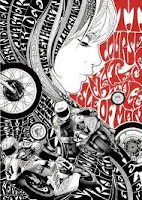On January 14, 1967, the outdoor Human Be-In organized by Michael Bowen helped to popularize hippie culture across the United States, with 20,000 hippies gathering in San Francisco's Golden Gate Park. On March 26, Lou Reed, Edie Sedgwick and 10,000 hippies came together in Manhattan for the Central Park Be-In on Easter Sunday. The Monterey Pop Festival from June 16 to June 18 introduced the rock music of the counterculture to a wide audience and marked the start of the "Summer of Love". Scott McKenzie's rendition of John Phillips' song, "San Francisco", became a hit in the United States and Europe.
The lyrics, "If you're going to San Francisco, be sure to wear some flowers in your hair", inspired thousands of young people from all over the world to travel to San Francisco, sometimes wearing flowers in their hair and distributing flowers to passersby, earning them the name, "Flower Children". Bands like the Grateful Dead, Big Brother and the Holding Company (with Janis Joplin), and Jefferson Airplane lived in the Haight.
In June 1967, Herb Caen was approached by "a distinguished magazine" to write about why hippies were attracted to San Francisco. He declined the assignment but interviewed hippies in the Haight for his own newspaper column in the San Francisco Chronicle. Caen determined that, "Except in their music, they couldn't care less about the approval of the straight world." Caen himself felt that the city of San Francisco was so straight that it provided a visible contrast with hippie culture.
On July 7, Time magazine featured a cover story entitled, "The Hippies: The Philosophy of a Subculture." The article described the guidelines of the hippie code: "Do your own thing, wherever you have to do it and whenever you want. Drop out. Leave society as you have known it. Leave it utterly. Blow the mind of every straight person you can reach. Turn them on, if not to drugs, then to beauty, love, honesty, fun." It is estimated that around 100,000 people traveled to San Francisco in the summer of 1967. The media was right behind them, casting a spotlight on the Haight-Ashbury district and popularizing the "hippie" label. With this increased attention, hippies found support for their ideals of love and peace but were also criticized for their anti-work, pro-drug, and permissive ethos.
By the end of the summer, the Haight-Ashbury scene had deteriorated. The incessant media coverage led the Diggers to declare the "death" of the hippie with a parade. According to the late poet Susan 'Stormi' Chambless, the hippies buried an effigy of a hippie in the Panhandle to demonstrate the end of his/her reign. Haight-Ashbury could not accommodate the influx of crowds (mostly naive youngsters) with no place to live. Many took to living on the street, panhandling and drug-dealing. There were problems with malnourishment, disease, and drug addiction. Crime and violence skyrocketed.
By the end of 1967, many of the hippies and musicians who initiated the Summer of Love had moved on. Misgivings about the hippie culture, particularly with regard to drug abuse and lenient morality, fueled the moral panics of the late 1960s.
















